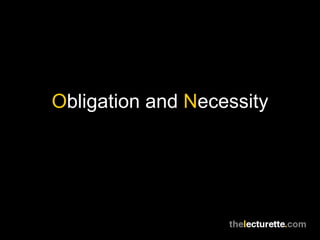Obligation and Necessity
•Download as PPT, PDF•
7 likes•16,460 views
Obligation and Necessity For more English tutorials, please visit: https://www.thelecturette.com
Report
Share
Report
Share

Recommended
More Related Content
What's hot
What's hot (20)
Giving command, expressing prohibition and giving instruction-group 7th

Giving command, expressing prohibition and giving instruction-group 7th
Similar to Obligation and Necessity
Similar to Obligation and Necessity (20)
Talking about the future using 'will' and 'going to'

Talking about the future using 'will' and 'going to'
More from theLecturette
More from theLecturette (20)
6 Effective Stepts towards Improving You Speaking Skills

6 Effective Stepts towards Improving You Speaking Skills
Recently uploaded
Mehran University Newsletter is a Quarterly Publication from Public Relations OfficeMehran University Newsletter Vol-X, Issue-I, 2024

Mehran University Newsletter Vol-X, Issue-I, 2024Mehran University of Engineering & Technology, Jamshoro
https://app.box.com/s/x7vf0j7xaxl2hlczxm3ny497y4yto33i80 ĐỀ THI THỬ TUYỂN SINH TIẾNG ANH VÀO 10 SỞ GD – ĐT THÀNH PHỐ HỒ CHÍ MINH NĂ...

80 ĐỀ THI THỬ TUYỂN SINH TIẾNG ANH VÀO 10 SỞ GD – ĐT THÀNH PHỐ HỒ CHÍ MINH NĂ...Nguyen Thanh Tu Collection
Recently uploaded (20)
This PowerPoint helps students to consider the concept of infinity.

This PowerPoint helps students to consider the concept of infinity.
Sensory_Experience_and_Emotional_Resonance_in_Gabriel_Okaras_The_Piano_and_Th...

Sensory_Experience_and_Emotional_Resonance_in_Gabriel_Okaras_The_Piano_and_Th...
UGC NET Paper 1 Mathematical Reasoning & Aptitude.pdf

UGC NET Paper 1 Mathematical Reasoning & Aptitude.pdf
Interdisciplinary_Insights_Data_Collection_Methods.pptx

Interdisciplinary_Insights_Data_Collection_Methods.pptx
Salient Features of India constitution especially power and functions

Salient Features of India constitution especially power and functions
80 ĐỀ THI THỬ TUYỂN SINH TIẾNG ANH VÀO 10 SỞ GD – ĐT THÀNH PHỐ HỒ CHÍ MINH NĂ...

80 ĐỀ THI THỬ TUYỂN SINH TIẾNG ANH VÀO 10 SỞ GD – ĐT THÀNH PHỐ HỒ CHÍ MINH NĂ...
ICT role in 21st century education and it's challenges.

ICT role in 21st century education and it's challenges.
Food safety_Challenges food safety laboratories_.pdf

Food safety_Challenges food safety laboratories_.pdf
Obligation and Necessity
- 2. Obligation and Necessity When you want to say that someone has an obligation to do something, or that it is necessary for them to do it, you use ‘must’ or ‘have to’. You must come to the meeting tomorrow. I enjoy parties, unless I have to make a speech.
- 3. Obligation and Necessity There is sometimes a difference between ‘must’ and ‘have to’. When you are stating your own opinion that something is an obligation or a necessity, you normally use ‘must’. I must be very careful not to upset him. We must eat before we go.
- 4. Obligation and Necessity When you are giving information about what someone else considers to be an obligation or a necessity, you normally use ‘have to’. They have to pay the bill by Thursday. She has to go now.
- 5. Obligation and Necessity Note: You normally use ‘have to’ for things that happened repeatedly, especially with adverbs of frequency such as ‘often’, ‘always’ and ‘regularly’. I always have to do the shopping. You often have to wait a long time for a bus.
- 6. Obligation and Necessity You use ‘must not’ or ‘mustn’t’ to say that it is important that something is not done or does not happen. You must not talk about politics. They mustn’ t find out that I came here.
- 7. Obligation and Necessity Note: ‘must not’ does not mean the same as ‘not have to’. If you ‘must not’ do something, it is important that you do not do it. If you ‘do not have to’ do something, it is not necessary for you to do it, but you can do it if you want.
- 8. Obligation and Necessity WARNING: You only use ‘must’ for obligation and necessity in the present and the future. When you want to talk about obligation and necessity in the past , you use ‘had to’ rather than ‘must’. She had to catch the six o’ clock train. I had to wear a suit.
- 9. Obligation and Necessity You use ‘do’, ‘does’, or ‘did’ when you want to make a question using ‘have to’ and ‘not have to’. How often do you have to buy petrol for your car? Does he have to take so long to get ready?
- 10. Obligation and Necessity WARNING: You do not normally form questions like these by putting a form of ‘have’ before the subject. For example, you do not normally say ‘How often have you to buy petrol?’
- 11. Obligation and Necessity In informal English, you can use ‘have got to’ instead of ‘have to’. You’ ve just got to make sure you tell him. She’ s got to see a doctor. Have you got to go so soon?
- 12. Obligation and Necessity WARNING: You normally use ‘had to’ , not ‘had got to’, for the past. He had to know. I had to lend him some money.
- 13. Obligation and Necessity You can only use ‘have to’, not ‘must’, if you are using another modal, or if you want to use an ‘-ing’ form, a past participle, or a ‘to’- infinitive. They may have to be paid by check. She grumbled a lot about having to stay abroad.
- 14. Obligation and Necessity I would have had to go to London. He doesn’ t like to have to do the same job every day.
- 15. Questions? For more slide presentations visit:
